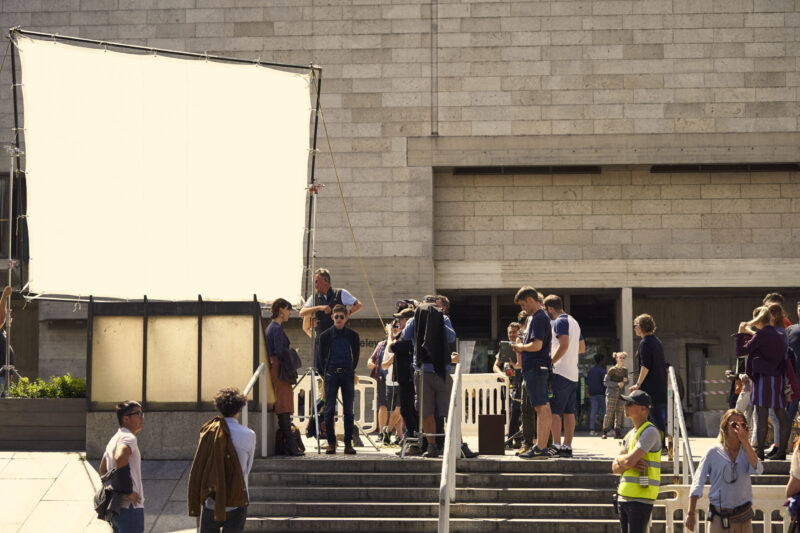So here’s the thing.
Sally Rooney’s latest novel, Beautiful World, Where Are You, was published on September 7th , and Michaelmas Term started a week later. Is there, perhaps, some hidden connection here?
This thought started percolating one dazzling summer evening back in June. I was with a friend and colleague, on our way to the previous Provost’s going-away reception, when our progress was halted in Fellows Square by a burly gentlemen with curly wires in his ears. Filming of Conversations with Friends was taking place in Front Square, he informed us, and we would have to wait. My friend, (never one to miss an opportunity), immediately impressed upon him the cinematic potential of two not-fully-gone-to-seed middle aged professors such as ourselves. After all, Normal People had Paul Mescal. The large gentleman was stoically unimpressed. So, it was only after there was no danger that we might accidentally be inflicted on the viewing public that he let us scamper across Front Square to salvage the last of the
Pimm’s.
Afterwards, however, I started thinking about that viewing public, sitting on their sofas in their multitudes all over the world, looking at Front Square. In fact, never mind all those thousands of people who have already watched Normal People, and who will no doubt watch Conversations with Friends. Even if we stick with the readers, between them, Rooney’s first two books have already sold over 305,000 copies in the US alone. That is the more the entire population of (say) Pittsburgh (population 302,911). That’s a lot of people who have imaginatively experienced the life of a Trinity student.
And Sally Rooney is not on her own. I read Louise Nealon’s Snowflake when it came out last May, (there is a US edition due on September 14). Once again, we have a novel about a young woman from the country (a farm in Kildare in this case) studying English at Trinity. Near the start of the novel, Nealon’s narrator, Debbie, has a great line: she remembers that before she was a student, she had “thought of
Trinity as a reverse Shawshank Redemption situation, where you had to bribe Morgan Freeman with cigarettes and tunnel your way in.”
Rooney’s first two books have already sold over 305,000 copies in the US alone. That is the more the entire population of (say) Pittsburgh (population 302,911
I had hardly finished Snowflake when along came Eimear Ryan’s Holding Her Breath (about a young competitive swimmer who comes to Trinity to study – you guessed it – English). At that point, Sinead Crowley from RTÉ coined the term “Trin-Lit”. It’s a thing, apparently. I’m now starting to wonder how many of what I thought were students in my seminars are actually fictional characters.
This started me thinking back to another novel to add to the Trin-Lit pile; Barry McCrea’s The First Verse, from 2005. Now, I know Barry. He once saved my life by loaning me an enormous jacket that he affectionately (but somewhat disturbingly) called “Mr. Puffy” when I was teaching for a week in Notre Dame one particularly sub-arctic Indiana winter. But I have no idea what The First Verse is about. The plot is straightforward enough (sort of). A young student (male in this case, and from Dublin) enters Trinity as a first year (but reassuringly studying English). “My third-floor room [in Botany Bay] was large and bright, furnished with a desk, single bed, and bookshelf, a sink in the corner and two old windows looking out onto the tennis courts and the gothic Graduate Memorial Building. I looked at the bookshelf and the bare walls, and up at the high, white ceiling, and I thought I will furnish thisroom with a life.” But this is where things get strange. Before long, he becomes completely obsessed with a cult-like group of students who make life decisions by concentrating on a question, and then “pulling a book at random from the shelf, open it at a random page and begin reading a random sentence” – from which “the right answer” invariably emerges. Add in a bit of astral projection, and we’re clearly not in Kansas (or even Pittsburgh) any more.
So what is The First Verse about? I honestly don’t know. A satire of some sort, perhaps? A coded gay coming-of-age/coming-out novel? A possibility. Or maybe it’s just a book about the strange thing that happens over the four years of university.
I’m now starting to wonder how many of what I thought were students in my seminars are actually fictional characters
Out of the millions of possible books in the world, you read a selection that are supposed to shape your future. Of course, it’s not quite a random selection (I can hear my colleagues sharpening their skewers), but it’s a small enough sample of the possible total all the same. And somehow, those books that we call the curriculum are supposed to point the direction to a future life. It’s strange and wonderful, when you think about it – especially when you know that the world is watching.
Prof Chris Morash is Trinity’s Seamus Heaney Professor of Irish Writ- ing and a former Vice Provost. He will this year be writing a regular column, “Thingmote”, for The University Times. The thingmote was a mound of earth which served as a meeting space in Medieval Dublin. It was located just outside where Front Gate is now.







